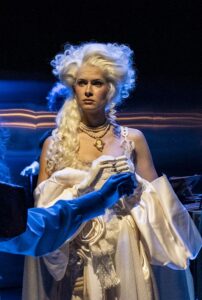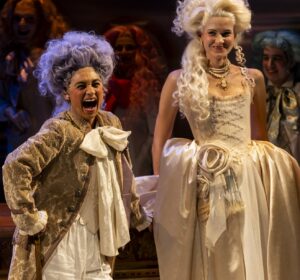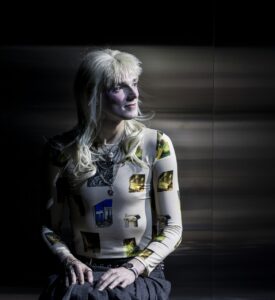Belvoir St Theatre, September 10
8/10

I dreamt I attended the theatre on a torrentially rainy night, and saw a play based on Virginia Woolf’s Orlando, her fantastical character who effortlessly swaps and blurs gender, while living from 1588 until modernity. But rather than attempting to replicate Orlando, the play was a theatrical fantasia drawing on Woolf’s teeming worlds.
As with all dreams, some details are blurry, although I seem to recall it being adapted by Carissa Licciardello (who also directed) and Elsie Yager. In each new epoch – Elizabethan, Restoration, Victorian, modernity – Orlando was played by a different actor. That’s one of the ways I knew I must be dreaming; that, and the opening Elizabethan sequence, with the Thames was frozen over, and everyone gracefully swishing around on roller-skates. I seem to recall a Richard Wherrett STC production of A Midsummer Night’s Dream where Puck was on skates, and another show at the Bondi Pavilion where Lord Nelson’s mother skated, but to have the whole cast of seven doing it could surely only happen in a dream – a dream complete with Shannon Burns’ choreography.
The Elizabethan Orlando was a mere slip of a boy played by Shannen Alyce Quan, who, where I was seated, struggled to project her voice above the deluge pounding Belvoir’s roof. Rightfully stealing this epoch was the Queen, whom, at first, I thought was Elizabeth, herself, until my dream-state convinced me it was Amber McMahon, wearing an outlandish gown, possibly designed by Ella Butler, that spread out like a round table at her waist, and then plunged to the floor to conceal her skates. Emily Havea was busily breaking Orlando’s fragile heart as Sasha, the Russian princess of no fixed attachment, and Nyx Calder gave us Nick Greene, the poet who rubbished Shakespeare and the rest as upstarts compared with the ancients.

The Restoration transition from Lord Orlando to Lady Orlando required no seven-day sleep, but merely Quan being replaced by Janet Anderson, whereupon Orlando thought herself much improved. McMahon was now an amusing suitor, while Havea sang a crowd-pleasing song (which sounded like Alan John’s admirable work) about living independently of society’s strictures.
Zarif was the androgynous Victorian Orlando, blessed with a voice that no deluge could obscure. Despite the delightfully oneiric imagery of black-clad figures adrift in a London fog, this epoch of the adaptation bogged down, except for a lively discussion about marriage without bounds.

Nic Prior played the final Orlando, non-binary and bewildered to be in Tower Hill Station, with strobe lighting (Nick Schlieper’s work, it seemed) depicting the hurtling trains. Modernity had ceased to be Woolf’s 1928, and had become our frantic 2025.
When it was over, I regretted awakening. The dream had caught all of Woolf’s whimsey, while her poeticism was rendered visually rather than verbally. Besides, too many plays are drab naturalism obsessed with that pernicious word, relevance. Give me dreamlike theatricality any night.
Until September 28.